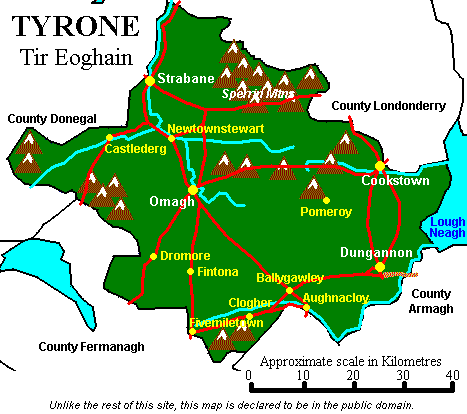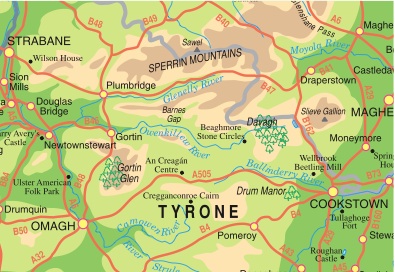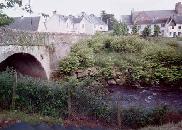|
The Clan McCullough (McCullar) The first of the name was Cullagh, son of Allil, who was killed in
a skirmish with the Picts in 864. As far back as the 11th century, this ancient family held the lands of Cardoness, Myretoun,
Ardwall, and Kirkcudbrightshire. The McCullough name first appears in records in 1296 when Thomas Maculagh del counte de
Wyggetone, as the sheriff of Wigtownshire, Scotland, rendered homage to king Edward I. He appears in records again in 1305
with his brother Michel, as a juror on inquest at Berwick, Scotland. Other early McCulloughs include Sir Patrick McCoulagh
and Gilbert McCoulaghe in Galloway, Scotland in 1354. Records show that Sir Patrick McCoulagh was awarded “100 marks
in recompense of his suffering and loss of lands in Scotland for his allegiance to the King of England in 1360.” Patrick
Mackullouch was listed as being the vicar of Arbroath, Scotland. The surname McCullough appears to be patronymical in origin and is an old Galwegian name (Galwegian means
inhabitant of Galloway, Scotland). Research indicates that the original name means “son of the boar’ and was
derived from the Gaelic word culagh. To the Celts, the boar was a symbol of fearlessness in battle and was used as a synonym
of McCullough. The Scots used the prefix “Mac” to denote “son of” and Mac was sometimes abbreviated
Mc or M’. There were two distinct groups of Scottish surnames the Highland and Lowland. The Highland Scots designated
a man by his father’s name, and they generally were associated with a clan. The clan system was largely responsible
for preserving the old ways of the Highlanders. A man would join a clan for protection and, to show allegiance to the clan
chief, he would adopt a clan surname; usually Mac followed by the chief’s name. County Antrim, Northern Ireland - Many McCulloughs left Scotland in the seventeenth
century for this beautiful land. Today there are more McCulloughs living in Northern Ireland than anywhere else in the British
Isles. Much obscurity enshrouds the true origins
of the ancient McCullough name. McCulloughs are said to be descended from Somerled through his second son Reginald Somerled
was a leading figure in the western Highlands and islands of Scotland in 1130 A.D. when he defeated the Norse and became
King of the Isles. His oldest son, Dougall, is the father of Clan MacDougall. From Reginald, his second son, not only did
the McCulloughs come but also the mighty Clan Ranald (MacDonald). The MacDonalds descended from Donald, the oldest son of
Reginald and the McCulloughs sprang from the seed of Ulgrie, King of the Strathclyde Britons. Records show that in 1507,
when the Earl of Derby, King of Man, raided the town of Kirkcudbright, Cutler McCulloch, chief of the clan, sailed to the
Isle of Man, which he ravaged and plundered. In 1514, a charter was granted to M’Culloch of Myretoun to the lands of
Merton, constituting them into a barony until the year 1566. In 1587, William McCullouch of Cardoness and his wife, Mary,
granted to their nephew, William McCullouch, the lands of Ardwall. In 1634, this family was raised to the rank of baronet
of Nova Scotia by Charles I. The last baronet was Sir Godfrey McCullouch of Ardwall. He was beheaded at Edinburgh on March
26, 1697 for shooting William Gourdon. The clan members left the area in large numbers and migrated to Ireland and North
America. The primary area of settlement in Ireland was Ulster, principally in the counties of Antrim, Down, and Tyrone.
Although there are still many McCulloughs (with various spellings) in Scotland, the greatest concentration of McCulloughs
in the British Isles are in Northern Ireland, There are approximately 5,000 McCulloughs with various name spellings in Northern
Ireland today. The
McCullough Coat of Arms Our Family
Motto is: “VI ET ANIMO” Individual Surnames
originated for the purpose of more specific identification. The four primary sources for second names were: occupation, location,
father’s name, or personal characteristics. The surname McCullough appears to be patronymical in origin, and is believed
to be associated with the Scott’s,meaning, “son of Cullach (boar).” The clan map shows the McCulloch clan in the northeast corner of Scotland in the Ross-shire
district. The McCullochs of Scotland descended from two groups: the McCullochs of Myretoun descended the McCullouchs of
Drummoral and Mull and the McCullochs of Piltoun descended the McCullochs of Cadboil. These descendants have lived in the
house of Ardwall since 1587. Walter McCulloch of Ardwall is the 6th in direct line and is today residing in Ardwall. He
appointment of Sheriff of Kirkcudbrightshire for many years. The McCulloughs were closely allied with the MacDonalds and
the MacDougalls through land holdings and marriages throughout the period of the clans. McCulloughs are believed to have
held the accompanied Alexander MacDonald, the tenth Earl of Ross, to Ross-shire in the fifteenth century and were granted
the lands surrounding the town of Tain. The name McCullough is recognized as being a sept of the clans MacDonald, MacDougall,
Ross, and Munro. Early US History McCullough’s Migration to the United States: When
the McCulloughs began migrating into North America in the middle 1700’s, most people could not read or write. Records
in Coffee and surrounding counties indicate that the original McCullough’s name was spelled McCulloch, McCullock, McCullo,
McCuller, McCullar and McCullough. Since most people could not read, the spelling of the name
was left up to the person entering the information into record. Even in the time of John Daniel McCullough, there was a
period of time when the family spelled the name McCollough. Modem spelling variations of the McCullough name include: M’Cullough,
M’Culloch, MacCulloch, McCulloch, M’Cullogh, McColloch, McCulley, McCullie, McCullo, McCulloh, McCullah, McCully,
MacCullough, McCollough, and McCullagh. It is quite possible that a large number of our direct relatives are using one of
the McCullough spelling variations given. Note from Áine: This article was
posted on Ancestry.com. I believe it to be in line with everything else I have found thus far regarding the Scottish connection.
The article does continue to go more indepth with the McKuller Family settled in Tennessee, I have not included the conclusion
here as it seems at that point to no longer be relevant to the scope of our site.
|






